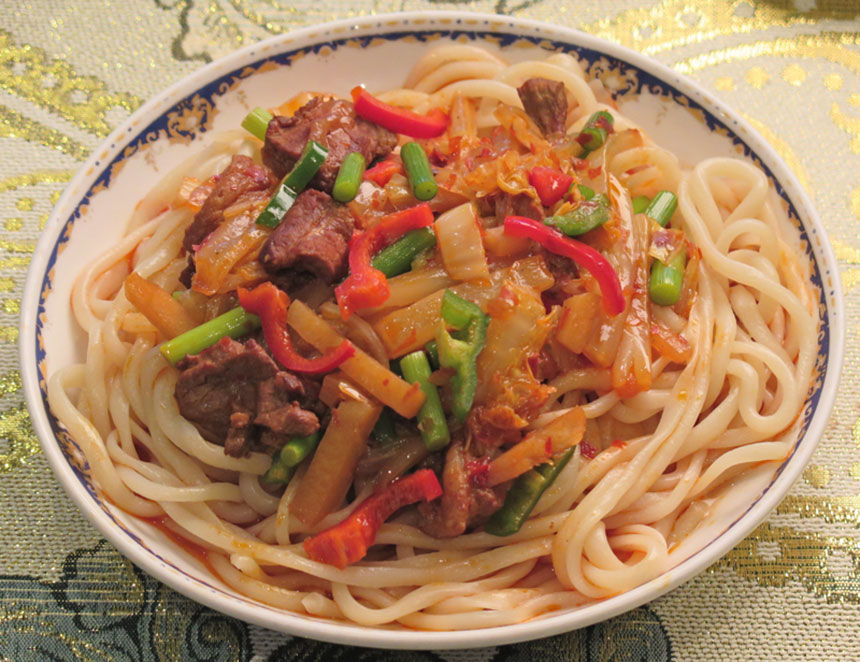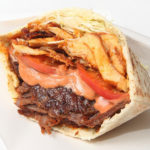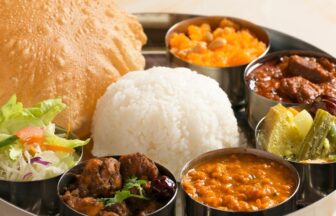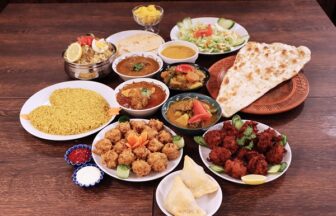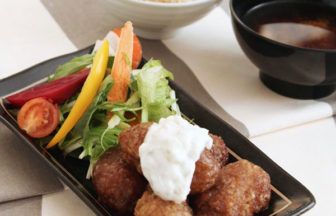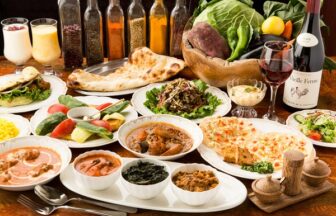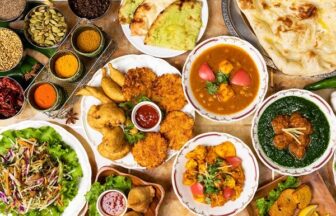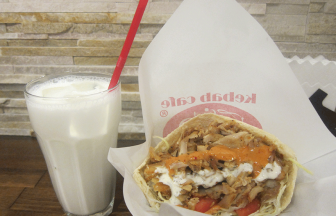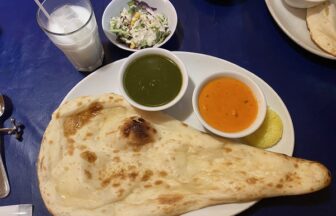Enjoy the taste of a skilled chef who has studied at a first-class luxury hotel in Urumqi
Silk Road Tarim Uighur Restaurant is a long-established Uighur restaurant in Tokyo that opened in 2010.
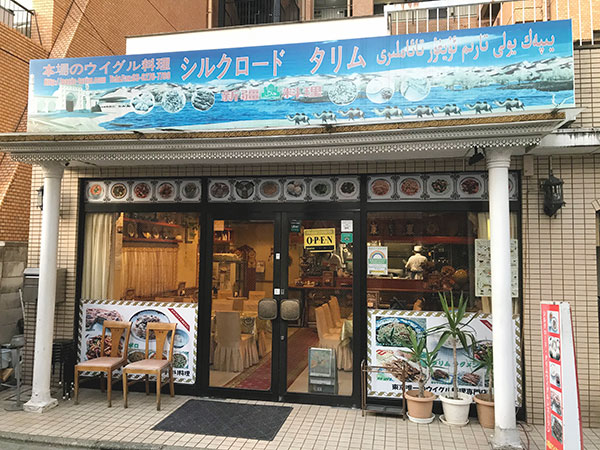
Silk-Road Tarim Uighur Restaurant
Uighur cuisine originated in the Xinjiang Uighur Autonomous Region in northwestern China. There are many Muslims around this area, so halal ingredients are used for cooking.
It is said that wheat dishes such as bread, noodles, and also spices that can be preserved for long time, have been developed along the Silk Road. This region was also suitable for wheat cultivation because it is dry and had less rain with many deserts surrounding the area.
At the Silk Road Tarim Uighur Restaurant, you can enjoy the authentic taste created by a veteran chef who has studied at a first-class luxury hotel in Urumqi. The hand-rolled noodles, which are stretched while being beaten by the traditional method, are fascinating with their vivid handling.
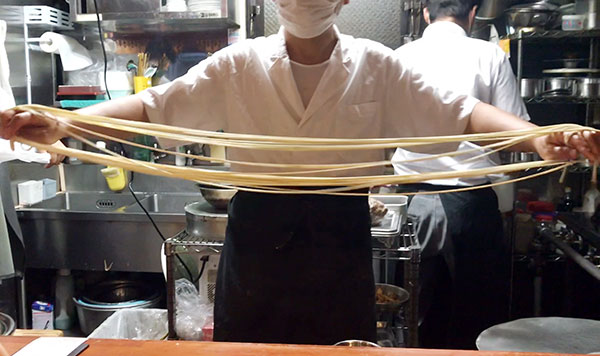
Handmade noodles
If you visit here, you definitely want to eat “Talim Laghman,” a signboard menu where the chef makes noodles by hand after receiving an order.
Plenty of tomato-based sauce with lamb and vegetables on top of strong udon-like noodles! The soft flavored lamb and crispy vegetables are exquisitely entwined with noodles and tomato sauce.
The Uighurs have a nomadic history and often use sheep meat in home cooking. Only Genghis Khan can be thought of as a typical sheep dish in Japan, but here you can enjoy a wide variety of delicious sheep dishes from the tongue to the internal organs of the sheep.
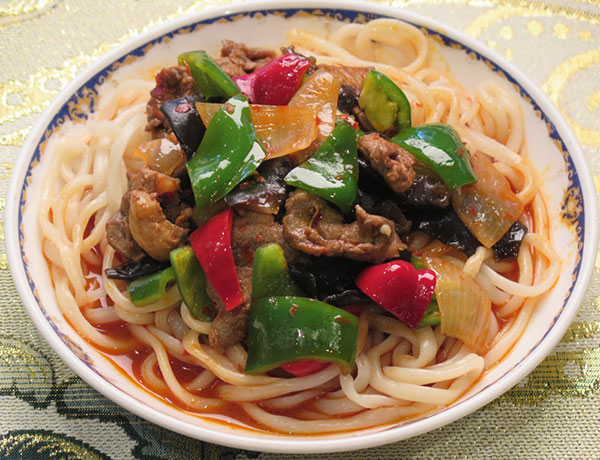
Talim special ankake noodles (Talim rugmen)
This is the classic dish “Shishikawapu,” which is made by soaking lamb meat with secret spices and grilling it on skewers. Juicy lamb and gravy with a scent of cumin and chili spread throughout your mouth, making it an addictive and essential dish that you can eat as many as you like.
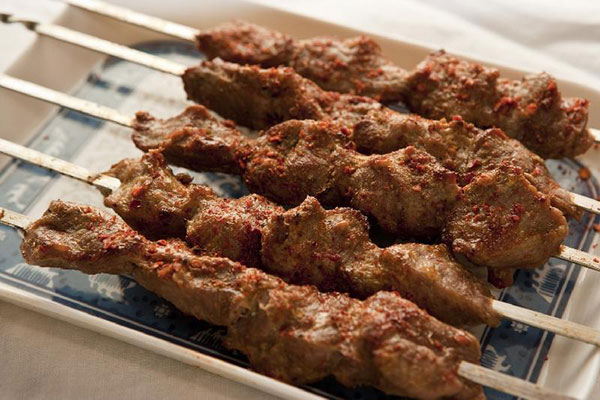
Lamb skewers (Shishikawapu)
Muslims don’t drink alcohol, but Uighur food matches and has an excellent combination with beer because of its moderately thick, spicy, and sour taste.
This is “Tugire,” a dumpling made from minced sheep. All the skins are handmade without using commercial products. It’s light because it contains plenty of leeks.
We also recommend the stir-fried lamb’s stomach, “Kerin Colmis,” which contains parts such as reticle.
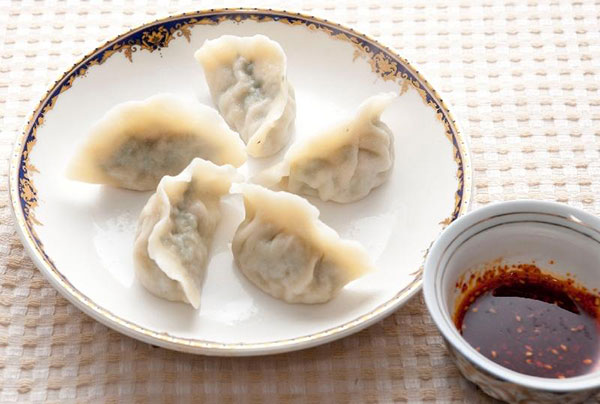
Sheep dumplings (Tugire)
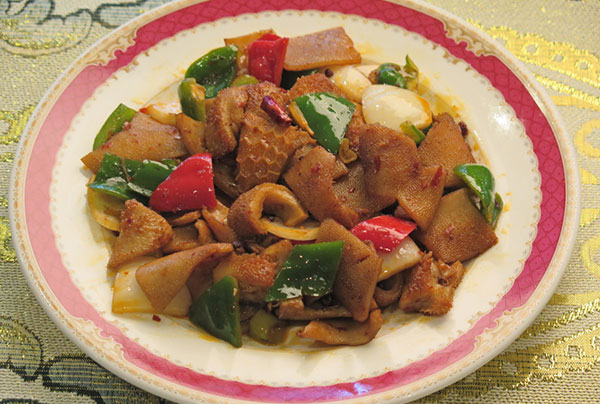
Stir-fried lamb stomach (Kerin Colmis)
The owner, SIRAJIDIN KERIM-san, came to Japan as an international student. After that, with the desire to spread Uighur culture to Japanese society, he established a company and opened the Silk Road Tarim Uighur Restaurant.
At first, many people didn’t know about halal and Uighurs, so they held study sessions at restaurants.
They will continue to contribute to the exchange between Uighurs, Japan, and the world through “food.” The restaurant name Tarim is derived from the mother river “Tarim River” that flows through the Taklimakan Desert in Uighur.
The intersection of the historic ancient Silk Road, the mysterious charm of Uighur cuisine.
Uighur dishes include dumplings, stir-fried dishes, noodle dishes, etc., which seem to have a similar taste like Chinese food. While chai, lamb skewers, pilaf, etc. have tastes close to neighboring countries such as the Middle East and Uzbekistan, from Silk Road.
It may be a feature of Uighur cuisine, having various influences from surrounding countries.
It is said that Uighur dishes have the roots of wheat dishes that are eaten in the world such as pasta, ramen, and udon noodles. Although it is unique, it has a taste that is familiar and nostalgic to the Japanese mouth.
This is a spicy stir-fried chicken. Ingredients are bone-in chicken with potatoes and peppers, original spices and peppers, star anise, cinnamon, Japanese pepper, etc.
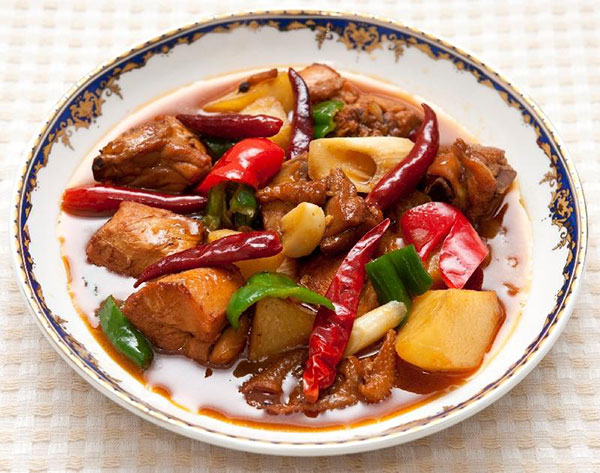
Spicy stir-fried chicken
It is a spicy dish with a lot of red pepper, but it’s not only spicy, but the umami and richness that comes out of the chopped meat is excellent. I eat this soup with kishimen.
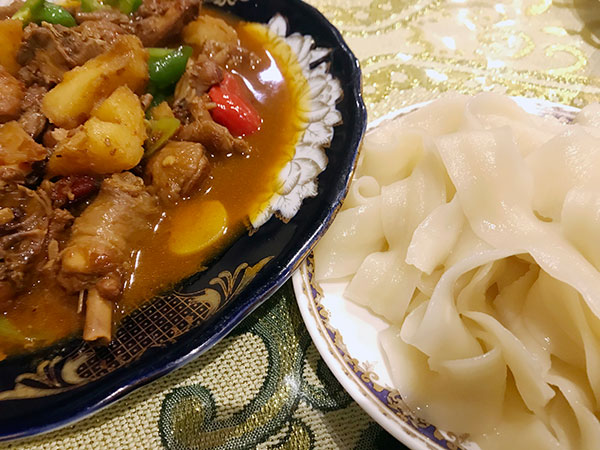
Handmade kishimen
The chewy kishimen is also handmade. The delicious freshly boiled and freshly beaten noodles only use wheat, salt, and water.
Even in Tokyo, where you can eat food from around the world, Uighur restaurants are rare. By all means, please enjoy delicious Uighur cuisine while thinking about the eternal history of the Silk Road.
Supervisor / Recommender

- Halal Supervisor and Foreigner Food Coordinator (Cooking, Consulting, Public Relations)
-
Click here for introduction
I currently work as an editor, but my previous job was as a chef, with many years of experience working in hospitals, restaurants, and the food service industry. Looking back, I think my connection to halal may have already been there.
Decades ago, I once worked in a cafeteria at an auction venue. Over 60% of the visitors were foreigners. Many Muslims were present, and the venue had a mosque-like prayer space. I remember being frequently asked questions about whether the meat was halal and what kind of meat it was. At certain times, the cafeteria would become as lively as a festival. The Indian restaurant next door would generously serve free biryani, curry, and sweet drinks to everyone who came. Over 100 people, including people wearing bright red turbans, galabeyas, and traditional attire, gathered in the cafeteria, all sitting around the same table and enjoying a truly enjoyable time. Looking back, it was iftar, the end of fasting, and I understand the significance of sharing, but at the time I was ignorant of halal and Islam, and didn't even consider how to respond. They only ate the curry made by the Indians in the restaurant. As I studied halal, I realized, "I wanted to eat Japanese food, but I couldn't." I regret not doing anything even though there was something I could have done.
If only it didn't contain pork! If only it didn't contain wheat or buckwheat! I could eat it... Food insecurity is different for each person.
That's why I think it's important to learn about the differences in culture, religion, and lifestyle that underlie it, and to create an environment where everyone can enjoy delicious meals in comfort.
The desire for delicious, safe, and secure food is universal. The times are calling for people to live in new ways that transcend borders and religions. I hope that halal can be a gateway to eliminating food insecurity, contributing even in some small way to a society where people can coexist and prosper with more liberal thinking, and to global harmony beyond.
Latest entries
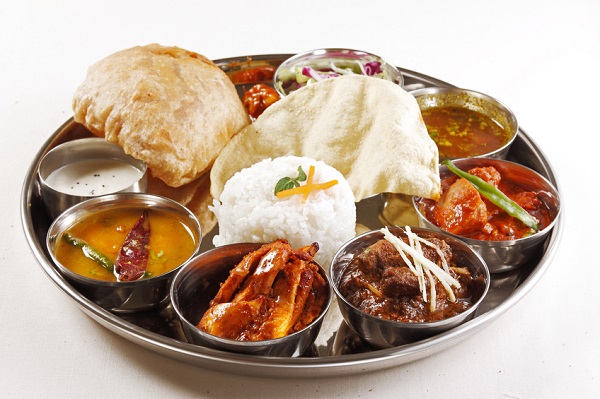 Tokyo2023年11月4日Dakshin South Indian Restaurant Otemachi Branch
Tokyo2023年11月4日Dakshin South Indian Restaurant Otemachi Branch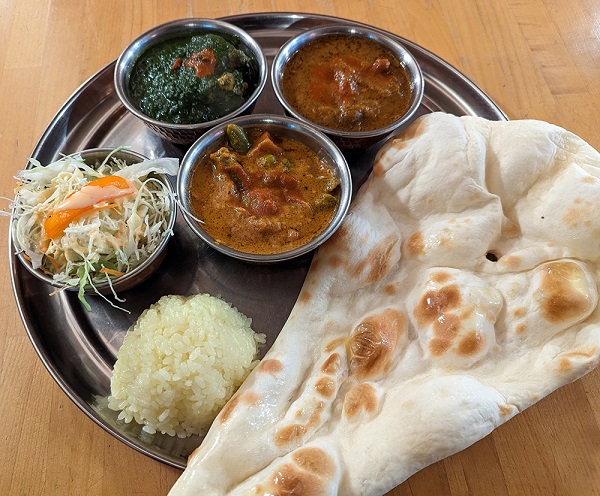 Tokyo2023年10月23日Gandhi Mahal
Tokyo2023年10月23日Gandhi Mahal Tokyo2023年10月23日Yıldız KEBAB
Tokyo2023年10月23日Yıldız KEBAB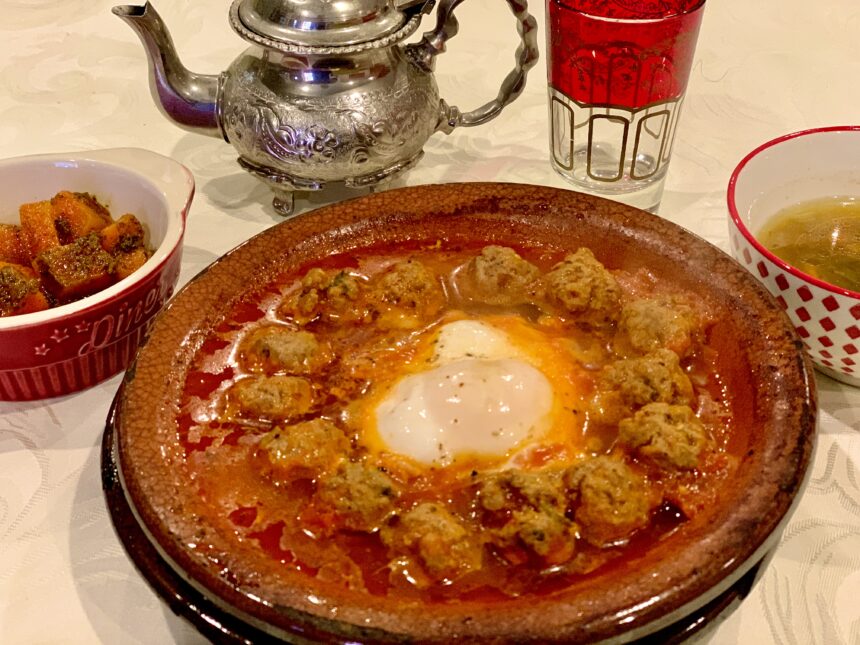 Tokyo2023年10月4日Restaurant Morocco
Tokyo2023年10月4日Restaurant Morocco

